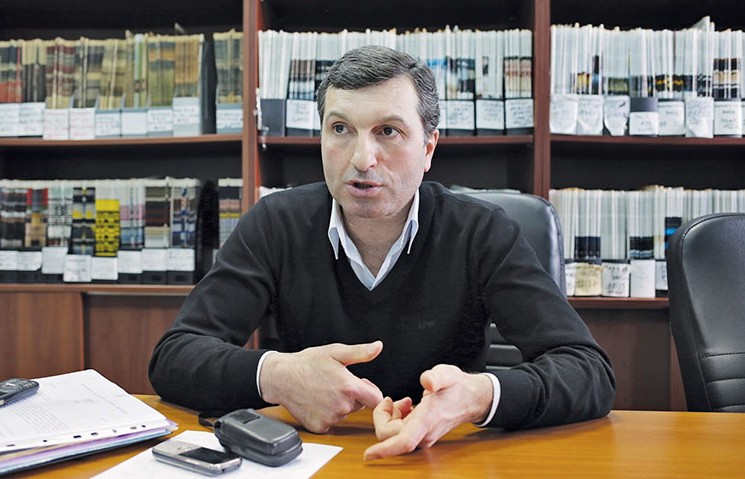Name: Oleg Levytskyi
Position: Head of Ukrainian Helsinki Human Rights Union’s legal aid unit
Key Point: The state ignores people without citizenship
Gela Tushishvili has spent 20 years in independent Ukraine as a stateless person. Although the government has briefly recognized him as a Ukrainian citizen twice, he has spent years of his time here living on a Soviet passport.
“Human rights are violated everywhere, but in Ukraine, it’s a total nightmare,” he told the Kyiv Post.
The 54-year-old Tushishvili grew up in his native Georgia, where he was a professional soccer player during the Soviet Union, and then Russia, before coming to Ukraine.
But after the collapse of the Soviet Union in 1991, he never traded in his Soviet passport, making him stateless.
Stateless people usually become known to a given government when the person seeks residency, citizenship or needs legal representation. A 2014 United Nations report placed the total at around 33,200 stateless people residing in Ukraine, while emphasizing that an “exact scale of the problem” is not known.
“In my soul, I felt myself to be a citizen of the Soviet Union,” Tushishvili said. “But I was extremely offended that we had lived together for 75 years and Ukraine would not register me.”
Oleg Levytskyi, a Kyiv attorney who is the acting head of the Ukrainian Helsinki Human Rights Union’s legal aid unit, took on Tushishvili’s case in September.
“The Ukrainian state ignores people without citizenship,” Levytskyi said. “It’s as if they did not exist.”
Passport withdrawn
Levytskyi mostly represents people facing citizenship issues, and the subsequent human rights violations that come with that.
The 48-year-old attorney represents clients ranging from stateless people like Tushishvili to Russians who came to Ukraine to fight in the east against their own country, and who are now seeking asylum.
“Stateless people come to us who have lived in the country without documents for decades. They cannot document the fact of their physical existence in any way,” Levytskyi said. “They’re not extradited anywhere, not deported, because they’re stateless.”
Tushishivili has spent the better part of the past 20 years in bureaucratic limbo. When he wasn’t hanging out at a migration service office, he says, he was being hassled by the police because of his “Caucasian appearance.”
But Tushishvili’s story of statelessness marks itself out from the thousands of others who face his problem. The Tbilisi-born Kyiv resident received Ukrainian identity documents two times, but then had them rescinded, Levytskyi said.

Gela Tushishvili has lived in Ukraine for more than 20 years without citizenship of any country. He hopes to receive a passport via court order, after Oleg Levytskyi took up his case. (Anastasia Vlasova)
Kyiv Oblast authorities granted Tushishvili a passport in 1999 based on his Soviet documents, after he registered in the apartment of a friend’s relative. But one year later, Tushishvili says, Solomensky district police took the passport from him after asking for his documents.
“They opened a criminal case against me for forging government documents,” Tushishvili said, adding that the police eventually determined that he did not forge the passport, but nonetheless did not return the document.
A second time in 2004, a Kyiv judge ordered the migration service to give Tushishvili permanent residency. The subsequent bureaucratic runaround lasted until 2011, when the migration service informed Tushishvili that they no longer agreed with the 2004 court ruling.
“The migration service is possibly the most wicked structure in our country’s executive branch,” Levytskyi said. “These cases tend to be hopeless.”
Defending the stateless
Levytskyi has worked with the Ukrainian Helsinki Human Rights Union since 2006, he said.
Unlike other Kyiv human rights organizations, the Helsinki group is willing to represent combatants from Russia’s war on Ukraine.
One of Levytskyi’s clients is a Russian who came, Levytskyi said, to volunteer to fight on the side of Ukraine. He applied for asylum, but the migration service has refused to grant him refuge in Ukraine.
The case is now on appeal.
But the sheer number of clients means that Levytskyi has to ration out his time among them so he can provide help.
He divides cases into two stages: simple legal consultation as the first stage, with free, full representation in court as the second.
For those he represents in court, Levytskyi says he can budget 10 days of time, maximum, to serve their needs.
“Three or four years ago, I was working alone,” he said. “We have more resources now.”
Levytskyi and Tushishvilii filed a complaint against the migration service, demanding the return of his passport, with a Kyiv court in December. They are now waiting for a reply.
“It should come within four months, but given the backlog, it could take as long as a year,” Levytskyi said.
Although cases like Tushishvili’s can often seem hopeless, Levytskyi sees a silver lining in the work.
“In spite of the state being disloyal to human rights and totally corrupt, there’s joy in that, in spite of these factors, we can help real people,” he said.
Corrections: This article was updated to reflect a 2014 United Nations estimate that around 33,000 stateless people reside in Ukraine.
